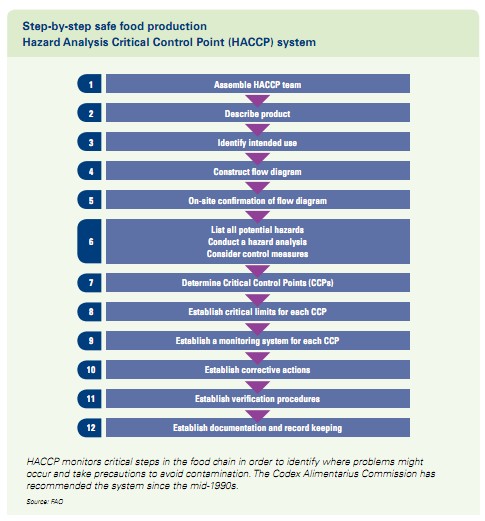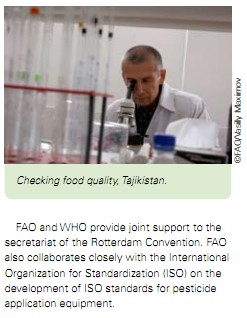FAO- International standards and development of codes to ensure food safety and protect biodiversity
Published: January 24, 2012
By: FAO
Striving for safe food and protecting biodiversity
As the world becomes more global, trade in agricultural, fishery and forestry commodities has increased. At the same time, the task of ensuring our world has safe food while protecting our natural resources from pests and diseases, including invasive species, has become more complicated. These issues concern everyone: farmers, foresters and fishers, processors, brokers, retailers and consumers, nongovernmental organizations and governments. FAO facilitates the intergovernmental adoption of international standards and development of codes, based on sound science, that help ensure food safety and protect biodiversity. The application of
these international standards and codes protects all stakeholders.
these international standards and codes protects all stakeholders.
International standards
FAO hosts the secretariats for two main standard setting organizations that are recognized by the World Trade Organization (WTO) Agreement for Sanitary and Phytosanitary Measures:
FAO hosts the secretariats for two main standard setting organizations that are recognized by the World Trade Organization (WTO) Agreement for Sanitary and Phytosanitary Measures:
- the Codex Alimentarius for food safety;
- the International Plant Protection Convention (IPPC) for plant health.
These secretariats facilitate the adoption of international standards. Members give input into the development of these standards and negotiate to reach consensus for their adoption. They also cooperate in helping to develop capacity for the implementation of these standards. The international standards serve as a basis for national regulations. This in turn helps harmonize the global application of food safety and phytosanitary measures.
Safe movement of plants
The IPPC and the International Standards for Phytosanitary Measures help ensure the safe international movement of plants, plant products and conveyances (e.g. containers, ships, vehicles), while reducing the risk of the introduction and spread of new harmful plant pests.
The IPPC, with support from FAO, facilitates meetings of technical experts for:
- the development of phytosanitary standards for import and export systems;
- pest risk analysis;
- pest management and specific standards for commodities;
- the identification or treatment of certain pests.
New standards are constantly being developed to meet members' needs. Information exchange is facilitated by the International Phytosanitary Portal (www.ippc.int). The Phytosanitary Capacity Evaluation tool assists Member Nations to identify gaps and needs in their national phytosanitary capacity.
Food safety standards
The Codex Alimentarius Commission, established jointly by FAO and the World Health Organization (WHO), has been setting food standards since 1963. The international application of the Commission's standards makes food safer for consumers and ensures fair practices in the growing global food trade to the benefit of farmers and other food producers. These international standards serve as a basis for national standards.
FAO and WHO support the standard setting process with scientific advice, allowing the Commission to set and update its standards based on the latest scientific knowledge in food safety. The provision of scientific advice includes the evaluation of chemical hazards, microbiological hazards, new and emerging hazards and technologies and risk-benefit assessments of various practices in the food chain.
The Joint FAO/WHO framework for food safety risk analysis and risk-based approaches ensure that the standard setting processes and scientific advice programmes meet the requirements of the WTO.
The accomplishments of the Codex Alimentarius Commission include:
- the establishment of over 200 food standards for single commodities or groups of commodities, covering major internationally traded food products and for labelling and methods of analysis;
- over 100 codes of practice and guidelines to reduce contamination and ensure food hygiene during production, handling and transport, including guidelines on food inspection and certification and for the assessment of genetically modified foods;
- over 3 700 maximum residue limits (MRLs) for the various pesticides and veterinary drugs used in agriculture;
- over 2 000 food additive provisions;
- 150 recommended maximum and guideline levels of contaminants and natural toxins, including mycotoxins.
All these outputs serve as benchmarks in international food trade and as a guide for harmonization of national food safety standards and regulations, regionally and globally.

Protecting natural resources
FAO promotes international agreements that help protect natural resources. Key agreements are:
- the Code of Conduct for Responsible Fisheries, which aims to ensure good fisheries management;
- the International Code of Conduct on the Distribution and Use of Pesticides, which helps countries to regulate these products and their use, especially when laws are lacking; and
- the Rotterdam Convention on the Prior Informed Consent Procedure for Certain Hazardous Chemicals and Pesticides in International Trade, which focuses on reducing the hazardous effects of pesticides.

FAO and WHO provide joint support to the secretariat of the Rotterdam Convention. FAO also collaborates closely with the International Organization for Standardization (ISO) on the development of ISO standards for pesticide application equipment.
KEY FACTS
- The Codex Alimentarius Commission has 185 members and covers more than 99 percent of the world's population. The IPPC has 177 contracting parties.
- World trade in agricultural, fisheries and forestry products amounts to US$552 billion annually.
- In industrialized countries, as much as one-third of the population suffers from food-borne diseases every year. Hazards include salmonella and campylobacter, both of which often contaminate foods from animals, and listeria, which contaminates raw meat, milk and vegetables.
- Food and waterborne diarrhoeal diseases are leading causes of illness and death in less developed countries. They substantially contribute to malnutrition and they kill approximately 1.8 million people annually, most of whom are children.
- In 2002 (revised 2009), guidelines were established for the treatment of wood packaging material used for shipping in up to 70 percent of cargo to help ensure that no unwanted insects are moved with the packaging.
- Invasive plant species are increasingly affecting sustainable food production and threatening livelihoods.
Source
FAORelated topics:
Recommend
Comment
Share
Recommend
Reply
Recommend
Reply
Recommend
Reply

Would you like to discuss another topic? Create a new post to engage with experts in the community.








